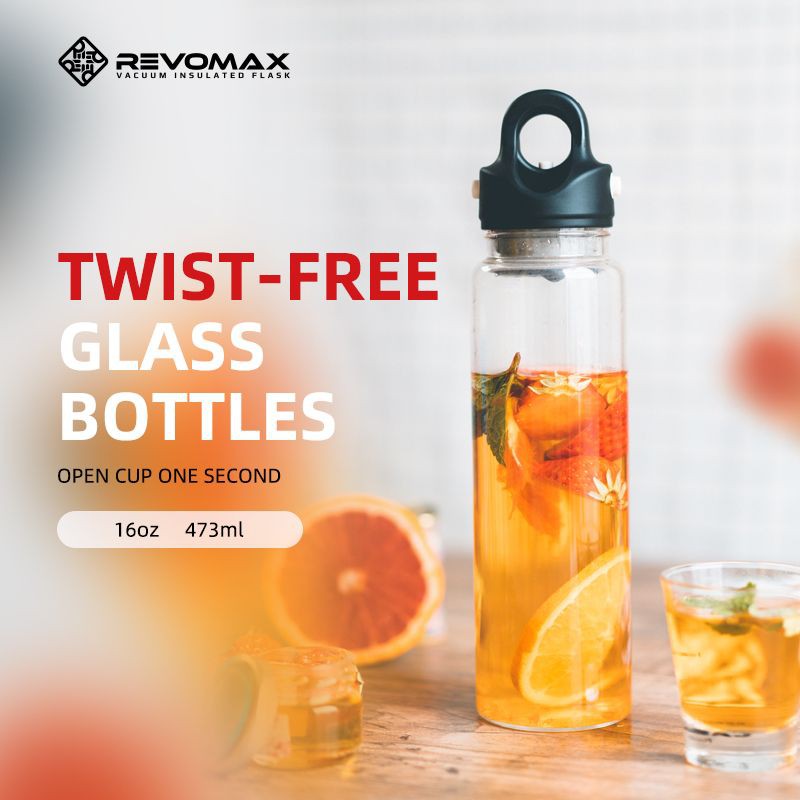Are lemon glass drinking bottles prone to scratching?
As a supplier of Lemon Glass Drinking Bottles, I've encountered numerous inquiries from customers about the scratch - resistance of our products. It's a valid concern, as scratches not only affect the aesthetic appeal of the bottle but can also potentially compromise its durability over time. In this blog post, I'll delve into the factors that influence the scratch - proneness of lemon glass drinking bottles and provide insights on how to maintain their pristine condition.
The Nature of Glass
Glass is a material known for its transparency, chemical inertness, and ability to preserve the taste of beverages. However, it also has a characteristic that makes it vulnerable to scratching: its hardness. On the Mohs scale of mineral hardness, which ranges from 1 (softest) to 10 (hardest), glass typically has a hardness of around 5.5 to 7. This means that any material harder than glass can potentially scratch it.
For instance, sand, which contains quartz (hardness of 7 on the Mohs scale), can cause scratches if it comes into contact with the glass surface. Similarly, metal objects like keys or coins, which are often harder than glass, can leave unsightly marks when rubbed against the bottle.
Manufacturing and Scratch Resistance
At our company, we take several measures during the manufacturing process to enhance the scratch - resistance of our lemon glass drinking bottles. One of the key steps is the use of tempered glass. Tempered glass is heat - treated to increase its strength and durability. The process involves heating the glass to a high temperature and then rapidly cooling it. This creates a surface compression that makes the glass more resistant to scratches and impacts.
Another technique we employ is the application of a scratch - resistant coating. This coating acts as a protective layer on the glass surface, reducing the likelihood of scratches. The coating is designed to be thin and transparent, so it doesn't affect the appearance or functionality of the bottle.
Factors Affecting Scratch Proneness
- Usage and Handling: How you use and handle your lemon glass drinking bottle plays a significant role in its scratch - resistance. If you toss the bottle around in a bag filled with other items, the chances of it getting scratched are high. It's advisable to keep the bottle in a dedicated compartment or use a protective case. For example, our Travel Glass Bottle with Silicone Cover provides an extra layer of protection during travel, reducing the risk of scratches.
- Cleaning: The cleaning process can also affect the scratch proneness of the bottle. Using abrasive sponges or harsh cleaning agents can scratch the glass surface. We recommend using a soft sponge or cloth and mild dish soap to clean the bottle. Avoid using scouring pads or abrasive cleaners, as they can damage the glass and any protective coating.
- Environmental Conditions: The environment in which the bottle is used can also contribute to scratching. If you're in an area with a lot of dust or sand, the particles can act as abrasives and scratch the glass. In such cases, it's important to keep the bottle clean and dry.
Maintaining a Scratch - Free Bottle
To keep your lemon glass drinking bottle looking new for longer, here are some tips:
- Use a Protective Sleeve: Our Glass Water Bottle with Sleeve provides an excellent solution for protecting the bottle from scratches. The sleeve acts as a buffer between the glass and other objects, reducing the risk of direct contact.
- Regular Cleaning: Clean your bottle regularly with a soft cloth and mild soap. This helps to remove any dirt or debris that could potentially cause scratches.
- Avoid Contact with Hard Objects: As mentioned earlier, keep the bottle away from keys, coins, and other hard objects that could scratch the glass.
Comparing with Other Materials
When compared to other materials used for drinking bottles, such as plastic or stainless steel, glass has its own set of advantages and disadvantages in terms of scratch resistance.
Plastic bottles are generally more flexible and less likely to break, but they are also more prone to scratching. Over time, plastic bottles can develop a hazy appearance due to scratches, which can affect their transparency.
Stainless steel bottles are highly durable and resistant to scratches. However, they lack the transparency and aesthetic appeal of glass. They also tend to retain the taste of previous beverages more than glass bottles.
In contrast, our lemon glass drinking bottles offer a balance between scratch resistance, durability, and aesthetic appeal. With proper care, they can maintain their pristine appearance for a long time.
Our Product Range
We offer a wide range of lemon glass drinking bottles to suit different needs and preferences. Our Juice Tea Glass Water Bottle is perfect for those who like to carry their favorite beverages on the go. It's made from high - quality tempered glass and features a stylish design.
Whether you're a fitness enthusiast, a traveler, or someone who simply enjoys a refreshing drink, our lemon glass drinking bottles are a great choice. They are not only functional but also add a touch of elegance to your daily routine.


Conclusion
In conclusion, while lemon glass drinking bottles are not completely immune to scratches, our manufacturing techniques and the right handling can significantly reduce the risk. By using tempered glass, applying scratch - resistant coatings, and following proper care instructions, you can keep your bottle looking new for a long time.
If you're interested in purchasing our lemon glass drinking bottles or have any questions about scratch resistance, we'd love to hear from you. Contact us to discuss your requirements and explore our product range. We're committed to providing high - quality products and excellent customer service.
References
- ASTM International. (2018). Standard Test Methods for Scratch Hardness of Glass by the Scratch - Groove Method.
- Glass Association of North America. (2019). Understanding Glass Performance.


